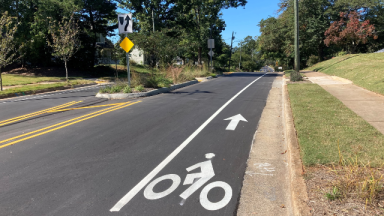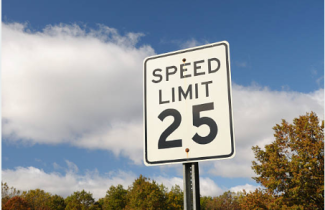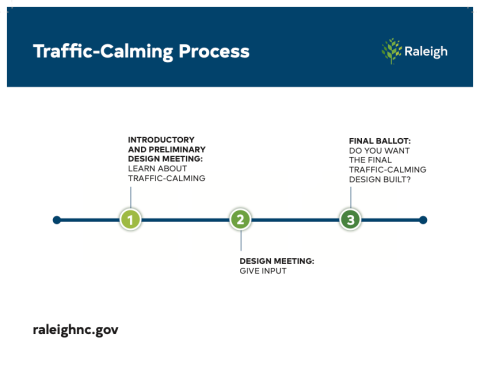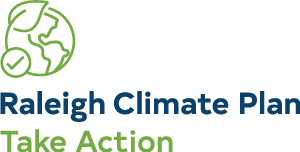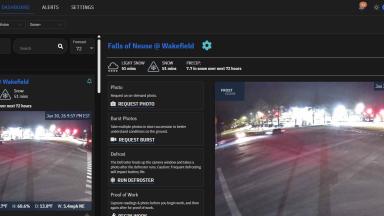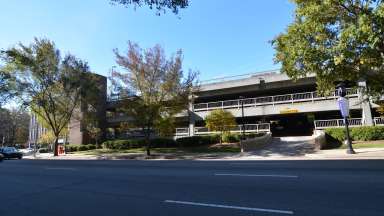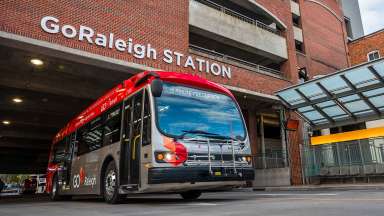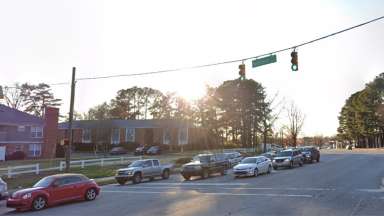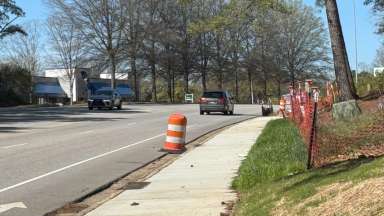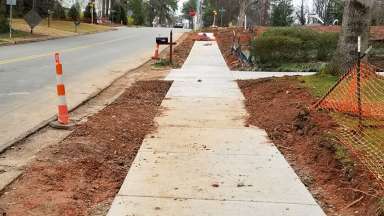Jump To:
Neighborhood Traffic Management Objectives
- Provide the highest level of quality of life in our residential areas
- Make sure our streets are safe for all modes of transportation such as cars, pedestrians, bicyclists, and transit.
- Working towards a goal of all cars traveling the speed limit on our residential streets
When a resident reaches out to NTMP, we start the process by evaluating the street to determine if a problem exists and how large of a problem exists in that area. Our evaluation will answer questions such as: How many cars are using the street, how fast are the majority of cars driving, and what potential conflicts with pedestrians exist.
To report a traffic management problem in your neighborhood or to request a traffic calming project, please complete the Transportation Improvement Request form on Ask Raleigh and select the options below:
*What are you requesting?
Something New
*What new infrastructure are you requesting?
Traffic Calming
Speed Limit Reductions
The first strategy for improving quality of life along your neighborhood street is to reduce the speed limit.
Staff will evaluate your street to see how many cars are using the street on a daily basis to determine if the speed limit can be lowered to 30 mph or 25 mph.
Streets with less than 4,000 vehicles per day will be lowered to 25 mph and streets with greater than 4,000 vehicles per day will be lowered to 30 mph.
The resident that initially reaches out to city staff kicks off a ballot process for all the properties along the street. City staff will generate and mail ballots to all properties that have property touching the street requesting the speed limit reduction, not just those that have an address on the street itself. Of the residents along the street that choose to participate, a majority of 50% + 1 needs to be in favor of the speed limit reduction. Once the ballot period closes, staff will present the request to City Council
If approved, the new speed limit will be posted along the street within seven days.
Click here to cast your ballot and receive status updates on Speed Limit Reduction.
Safety Evaluations
The Neighborhood Traffic Management Program can look at intersections throughout the City of Raleigh to see if the addition of a multiway stop or other intersection devices, such as curb bump outs, pedestrian islands, or neighborhood traffic circles will increase intersection safety. Multiway stops take the form of three-way or four-way stops.
When performing our evaluation, staff will look at nationally recognized safety criteria to help determine if change to an intersection is appropriate. Criteria we look at includes:
- Volumes of traffic (cars, bikes, and pedestrians) entering the intersection on each approach;
- The number of crashes that have occurred within the last 3 years at the intersection; and,
- The sight distance for each approach at the intersection
After we review the information gathered from the criteria above, we will make our recommendation. If it is determined that adding stop signs or different safety devices will increase intersection safety, staff will recommend updates to the intersection be implemented.
Stop sign requests are routinely requested by residents in the hopes that it will reduce the speed of cars using the street. Although the speeds immediately surrounding an intersection may be lowered, the stop sign may increase a driver’s speed along the rest of the street making an existing problem worse. Each street is unique, and staff will examine all potential options available and make a recommendation that will best meet the needs of your unique situation.
If you wish to read the adopted Multiway Stop standards set forth by the Federal Highway Administration, please use the link below to read through the policy standards.
Requesting a Traffic Calming Project
When there is a consistent speeding problem along a street, the neighborhood may wish to consider a traffic calming project.
Request a Traffic Calming Project
Traffic calming is a request made throughout the whole of Raleigh in virtually every neighborhood. To best manage the requests to ensure effective and equitable distribution, the City of Raleigh has established a process for which all streets must follow in order to receive a traffic calming project. This presentation provides a high level overview of what traffic calming is, the project process, how streets become eligible, examples of treatments, and contact information for NTMP staff.
The Traffic Calming Project Process
The City of Raleigh attempts as many traffic calming projects per cycle as possible. Staff will typically work with the top ranked 10 - 20 neighborhoods from the list of streets approved by Council for project coordination.
Schedule of Traffic and Parking Regulation
To review the existing traffic and parking regulations, please use the link below.
